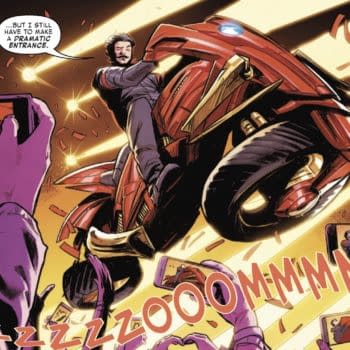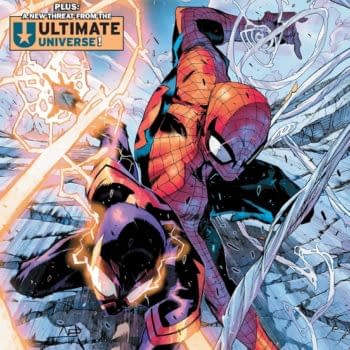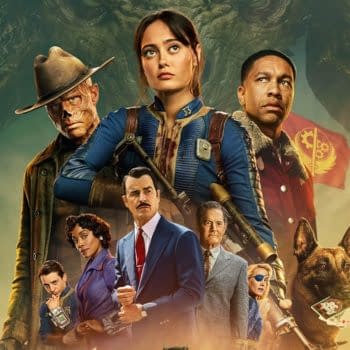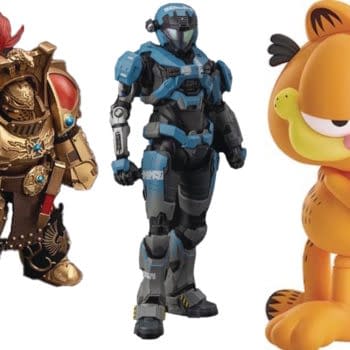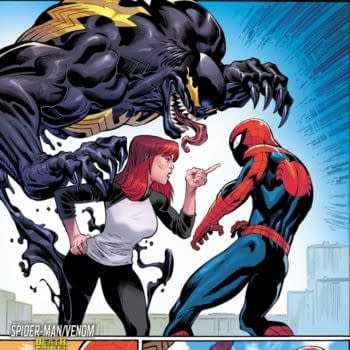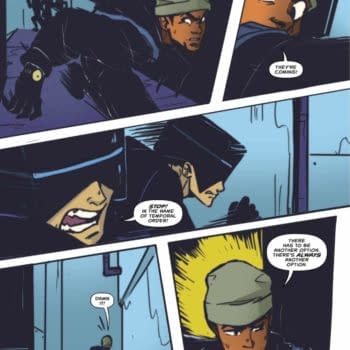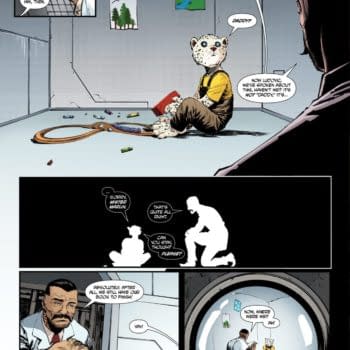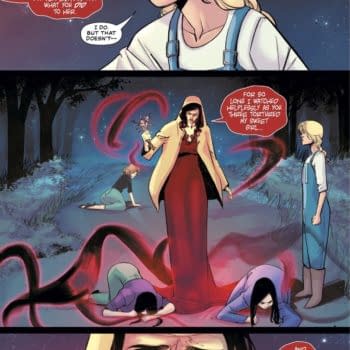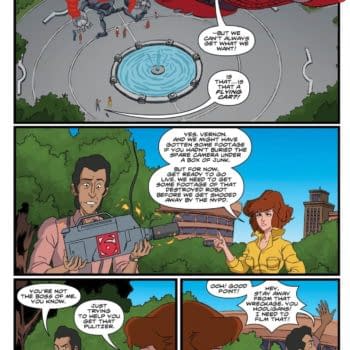Posted in: Comics, Recent Updates | Tagged:
The Curse Of The Dead Parent In Comic Books
Greg Anderson-Elysee writes,
A couple of weeks ago, I launched the Kickstarter for my first comic, Is'nana the Were-Spider. I was surprised at the immediate response the book garnered and the amount of money the campaign raised, meeting my goal within the first 3 days. A lot of the messages I was getting from backers of the campaign were from parents, in particular fathers, thanking me for creating a book that not only showcased a young Black hero, but also focused on his relationship with his father, Anansi the Spider, also known as the West African God of Stories. Quite a few backers have told me they were looking forward to sharing this story with their children.
When it comes to comic books, the theme of parentage plays a prominent role in certain characters' backstories. Clark Kent would not have been such the upstanding citizen known as Superman if not for the upbringing from his parents, Martha and Jonathan Kent. Wonder Woman will always be Hippolyta's little girl, no matter whether she succeeds or fails. Thor will always butt heads with Odin while proudly carrying out his name as Odinson.
Yet the chances of a parent staying alive in a superhero/comic book are rare. Deceased parents, a trope all too common in superhero stories, is often an important component of that character's origin. Bruce Wayne's war on crime every night dressing up as the Batman is a reaction to the death of his parents. Peter Parker takes up the responsibility to be a hero at all costs after his father figure, Uncle Ben, is shot by a robber whom Peter previously let get away due to pride and arrogance.
Not every superhero has a parent involved in their mythos. There are a lot of heroes (and villains) whose parental upbringing we haven't been introduced to, and some simply referenced or briefly showcased. A good number of superheroes tend to become parents in their own right, their characterization and development being presented as the next stage of their lives, in a sense "aging" and maturing them.
Knowing how important my parents – ALL of my parents, including my step parents and aunts who have raised me – are important to me and my development, some supportive in some of my pursuits, some disappointed in other aspects of my life, I tend to appreciate seeing family moments in comic books, in particular father and son moments. Given that I didn't grow up living with my father, I always loved and appreciated him for always taking the time out to have me over, to come visit me, and support me in every way he can. It may have been an extremely messy situation between my parents when it came to me, but my pops made sure to be there, and knowing many people who either don't know their fathers or may not have a strong relationship with theirs, its something I appreciate more than many people know. Maybe more than my dad actually knows.
I find myself disappointed at the number of actual relationships between fathers and sons when it comes to Black characters. We don't get to see many bonding moments when it comes to black fathers and sons, like flashbacks that show a father being there to teach them how to ride a bike or teach them right from wrong and other touching moments. Due to the disappointing numbers of representation for characters of color, it really isn't that much of a surprise when you really think about it, but at the same time it does make you rack your brain trying to figure out a comic book that actually has a focus on a Black father and son. We have T'Challa the Black Panther who strives to live up to his father's legacy as the King of Wakanda, but the actual showcasing of their relationship really isn't focused on. Static is probably one of the rarest comics that actually show a loving relationship between a Black father and son. More recently, we have the more troubled and complex relationship between Miles Morales and his father, a relationship that many children (and adults) struggling with themes like sexuality and the fears of coming out to a parent can relate to, with Miles Morales' father being prejudiced and a bigot against mutants or beings with powers. There's also the struggling dynamic between Cyborg and his father, Silas Stone, currently being written and fleshed out beautifully by David Walker, and also Blue Marvel's relationships with his sons, one of which attempted to be his father's nemesis but eventually reconciled, an on-going subplot developed by Al Ewing in his Avengers books. To be perfectly honest with you, most of those relationships I had to really think about or ask some of my Black comic geek friends and peers if any came to mind, with it generally taking them a bit of time to really think of many options that made us say, "Oh yeah! I forgot about that one!"
There are also some stand out moments in some indie books, like Sean Anderson and his touching scenes with his father in Robert Jeffery II's Route 3, moments of both tension and love. And also Midnight Tiger by Ray-Anthony Height.
My upcoming comic book, Is'nana the Were-Spider, is generally a story about a Black father and son (although the father is more so a spider, but Anansi as a Black figure in African mythology is still of importance to this tale). Anansi the Spider is the West African God of Stories. He is one of the more popular Black mythological characters in the Black Diaspora, portrayed in various media and represented in various ways, from a Godlike figure to a hero, and on some occasions a villain! Whether known or forgotten, the character has a legacy. I created Is'nana, the son of Anansi, to act as his legacy, not only biologically but also in keeping his status alive. Is'nana is a bit of an oddball next to his siblings, and especially compared to Anansi. Anansi in the old tales is a selfish, rude, clever, charming, annoyingly self-absorbed trickster who gets himself into all types of trouble. Is'nana, unlike his father, is kind-hearted and generous, self-deprecating, but seeks to make his father proud while attempting to figure out his place in the world. Their differences will surely have them clash and butt heads, but like a lot of family and friends, their love and appreciation for each other will always be prominent.
Despite Anansi the Spider being rough around the edges, at this point of his life he wants to leave a mark on the world by being a good example for his son, Is'nana, although at times it's very hard to see due to his weird personality. While Anansi is very combat ready, he knows there are other means of fighting for his existence. But push him in a corner and poke him long enough, he will fight back. And that's especially prominent in Is'nana, who in a sense is a bit of a pacifist, which leaves Anansi both worried for his son's safety but comforted knowing he raised an empathic child.
Finding a character one can relate to in terms of race, sexuality, ethnicity, gender, experiences, etc, is something many readers strive for. It continues to be a major topic in the fight for diversity. Black love is an aspect that many Black readers feel is lacking in comic books. The portrayal of Storm and Black Panther was such a hot topic for the comic community; their divorce was seen as an attack against Black representation among a lot of Black readers who enjoyed seeing a loving Black power couple. Black love also counts for all showcasing of Black relations, be it romance, family, friendship, etc.
I can only hope Is'nana the Were-Spider can help fill a void that I feel is missing when it comes to representing a relationship between a Black father and son. While not directly based on my father and mine's personalities, I still couldn't help but think of moments with my father and I while I wrote this book. This book became a bit of an ode to all my parents, in fact.
Loving relationships between Black family members is something that I will continue to wish to see, especially in genre pieces like fantasy and sci-fi. Although I wasn't a fan of the movie After Earth, it made me really happy to actually see a science fiction film that focused on a Black family. There honestly aren't many genre films with a portrayal of a Black family of that caliber, so that alone would have prompt me to want to support such an effort. I'll continue to want to see more of these relations and I can only hope more creators become conscious of this to want to portray it, especially when we continue to want to see products that reflect the world we live in and have products that we wish our kids can look up to see themselves as those heroes standing tall and proud. Just like that, we could also aspire to see the loving parents who played a part in the development of those proud heroes. What do we have to lose?
Special thanks to Jude Terror of theOuthousers.com, Okwudili Uded, Brent Lambert, and Toby Quested of Chocolate City Comics.












